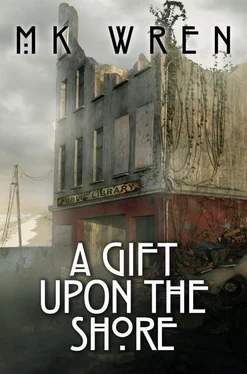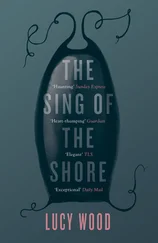Mary nearly gave in to the waiting tears. No nightmare could be worse than what Rachel faced waking. The pain was wearing her down like the sea constantly battering its shores. Mary opened the canteen, filled the cup, and added three drops of laudanum. Such a small bottle, so little of the precious fluid left.
Rachel grimaced at the bitter taste, but downed it eagerly, and Mary rose, dug a depression into the soil with her boot heel, and kicked the vomitus into it, then knelt to right the gauze tent over the leg. Had the red shadow tentacles extended so close to the knee earlier this morning? She straightened the sleeping bag and said, “I found some sphagnum, so maybe we’d better try the World War One remedy.”
Rachel winced. “Maybe we’d better just let it be.” Then she studied Mary, finally nodded. “All right. Try it. After that, there’s nothing left but the ax.”
Mary turned away as if she’d been struck, and Rachel sighed. “I’m sorry. Just more gallows humor. I don’t want to die. I want more than anything to live. And I don’t want to die like this.”
“You’re not going to die !”
Rachel laughed briefly. “That would be a very unnatural state of affairs. You didn’t get converted at the Ark, did you?”
Mary rose. “I have to take care of your leg. The sphagnum—I don’t know whether I should try to sterilize it, or if that would—” “Mary, please…”
The aching appeal reached through to Mary, and she sank to her knees. She didn’t try to speak.
Rachel said, “If the sphagnum or your friend’s herbal remedies help, no one will be more grateful than I. But I’ve had to face the fact that nothing is likely to help, that I’m dying, and you must face that, too. I have some things to say to you, and I want to say them now while I’m still clearheaded.”
Mary pulled in a deep breath, shifted position until she was sitting cross-legged. “All right, Rachel.”
“First, when you see your friend Bernadette, thank her for the laudanum. That was an act of mercy.”
“But I won’t ever see Bernadette again.”
“Yes, you will, you must. Mary, you must go back to the Ark.”
“What?” Mary stared at her. “No, Rachel. Never!”
“Just until your baby is bom. I’m sure the good Doctor will take you back if you put on a show of penitence. You can’t deliver this baby alone. If I thought I’d forced you into that, into something that could cause you untold pain, that might… kill you…”
“You didn’t force me into anything, and women have been known to deliver their own babies successfully.”
Rachel shook her head impatiently. “But it’s too much of a risk!”
“If I go back to the Ark, I might never be allowed to leave it.”
“I can’t believe you couldn’t outsmart that man, that you couldn’t manage to escape with your baby. But if you die because of me—Mary, please, promise me you’ll go back to the Ark.”
Mary rested her hands on the curve of her belly, felt a tentative movement there, and wondered if there was any way to make Rachel understand that she would willingly face death—for herself and this child—rather than go back to the Ark. Yet she couldn’t let Rachel suffer even this small additional anxiety. She said, “I promise you, I’ll go back.” A false promise, but that didn’t matter. Rachel was satisfied.
“Thank you.” She took a deep breath and for a moment seemed to be gathering her strength. “There’s something else I must talk to you about. Mary, I always had the advantage in this relationship—what exists between you and me. I’m twice your age, and the odds have always been in my favor that I’d die before you did.”
Mary laced her hands tightly. “Where’s the advantage in that?”
“Only that it was never likely that I’d have to grieve for you. It was always likely that you’d have to grieve for me.”
“I never should’ve left you.” Her eyes squeezed shut against the pain that threatened to escape the dark mantle. “If I’d stayed at Amama…”
She felt Rachel’s hand on her clenched fists. “That’s exactly what I must talk to you about. I can’t stop you from grieving for me— that’s a part of love—but I don’t want you to add the salt of guilt to the grief.”
Mary shook her head, but she couldn’t speak. She wanted to say, to shout, You’re not going to die . But she could no longer believe that any more than Rachel did.
“Mary, what if Luke had never come to Amarna? I still could’ve cut myself badly, and you’d be with me, but what could you do? There’s no medicine available at Amarna to cure blood poisoning or gangrene, and for you to try an amputation would be futile. Whether you were with me or not, the outcome would be the same. And these last ten years have been a bonus of sorts. We kept each other alive. And living. I’m grateful for those years. I’ve had good company and even accomplished something for posterity. What more can a human being ask?”
Mary accepted the forgiveness she saw in Rachel’s eyes as she had promised to return to the Ark. She accepted it for Rachel’s sake, because it was an extraordinary gift, and to refuse it would be to deny the love Mary felt for her and to burden her with more pain.
“That’s all I have to say, Mary.” Rachel let her eyes close. The laudanum was beginning to slur her words, slow her breathing. “So, now… you’d better try the sphagnum. And fix me some herb tea. I’ll try to keep down some food later.”
Mary rose, looked around dazedly. Things to do. Yes, she had things to do. The sphagnum for Rachel’s leg, the fire—it was down to embers—and tea and the stew. Oh, yes, things to do…
In the long reaches of the night Mary was wakened by Rachel’s nightmare. Another dose of laudanum let her return to quiet sleep, and Mary added more wood to the fire, huddled over it to warm herself, then went to the bank to look out at the moon-silvered sea.
I have even accomplished something for posterity .
The books.
Rachel hadn’t mentioned them. Perhaps she didn’t consider it necessary.
She couldn’t have finished the Herculean task of sealing and storing all the remaining books in the last six months, but enough to make her feel she could die satisfied with her contribution to posterity.
Mary thought of the books with a kind of hunger, a longing for words and their boundless range of expression. And she remembered how in another era she had ached and sweated over words, how she had hammered at them, molded them, cast them into harmonies that would ring in a reader’s mind like a struck bell.
Mary Hope had been a writer.
She had forgotten that, and it should not be forgotten.
Rachel Morrow had been an artist. She had shaped insight into images, and that should not be forgotten. That it was possible for a gifted human being to perform such metamorphoses should not be forgotten. That it was possible for any human being to reach for the potential within the mind, to reach for understanding, for a new metaphor, a new image, a new harmony, to reach for the spectrum of emotion and conviction called love—that should not be forgotten.
Grief is a part of love .
Mary watched the ghosts of breakers tumbling onto the sand and felt the impatient stirrings of life within her.
This child would remember.
The day began in fog that obliterated the sea, yet when Mary looked straight up, the fog had a blue cast from the sky beyond. She knew that if she were standing a hundred feet higher, she’d be in full sunlight, looking down on clouds snugged into the contours of the shoreline. But she found an equivocal satisfaction in being submerged in the silent fog that made watercolor-wash patterns of the trees, that drew the limits of her world close and centered them on a crackling fire.
Читать дальше












